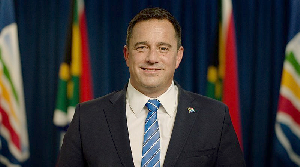- Home - News
- TWI News | TV
- Polls
- Year In Review
- News Archive
- Crime & Punishment
- Politics
- Regional
- Editorial
- Health
- Ghanaians Abroad
- Tabloid
- Africa
- Religion
- Election 2020
- Coronavirus
- News Videos | TV
- Photo Archives
- News Headlines
- Press Release
General News of Friday, 26 May 2000
Source: PANA
First Lady Launches Female Condoms
ACCRA, Ghana (PANA) - Ghana's First Lady, Nana Konadu Agyeman Rawlings, has described the introduction of the female condoms as a "long awaited global dream come true for Ghanaians" and said it would give women in the country a greater voice in sexual and contraceptive decision making.
In a message at the official launch of the condoms in Accra Thursday, she said Ghana is reported as having the second highest prevalence of HIV in the West Africa and since women are known to be at more risk, they need to be empowered.
She noted that giving women greater control of their reproductive health is critical not simply because of the obvious health benefits, but because it spills over into improving the lives of their partners, children and hence the nation's future.
"Female condom is the first barrier method for women which provides protection from both unwanted pregnancies and sexually transmitted infections, including HIV/AIDS. This launch marks an important milestone towards efforts to improve access to quality reproductive health services to the populace and particularly in the fight against HIV/AIDS in Ghana," she added.
The First Lady said global meetings have emphasised the need to "develop contraceptive methods which are non-systemic and do not produce side effects often associated with hormonal methods such as oral contraceptives, injectables and implants."
She appealed to the community to talk to children about sex, saying "while our messages to adolescents emphasise morality and abstaining from sex, they should not be denied information and services when needed."
Dr. Kweku Danso-Boafo, the health minister, said the ministry, in conjunction with its partners, has decided on a price of 300 cedis per female condom for both private and public outlets. (1 US dollar is 4,800 cedis.)
He said there is the need to improve contraceptive method mix through increasing options or choices available in order to curb "our high fertility rates to levels that are commensurate with our development goals and objectives."
Danso-Boafo said the introduction of the new condom is not going to replace the male condom, but rather it would provide Ghanaian women and men with valuable extra options in protecting themselves.
The minister added that 3,000 medical and non-medical service providers have been trained to provide information and services on the female condoms in three regions and plans are underway to extend the services to the rest of the country.
Mitchell Warren of the Female Health Company, the sole manufacturers of the condom, stressed the need for political will and community participation in fighting against the spread of AIDS.
He said the product has been introduced in 35 countries and that the public health rational for the introduction of the condom is to empower women in their sexual choices.










